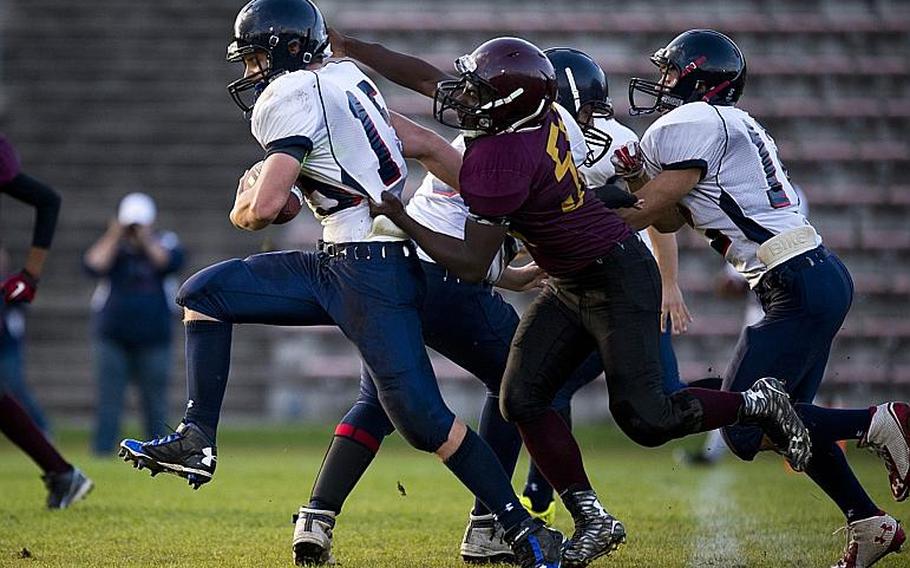
Bitburg's John Blake tries to break a tackle by Baumholder's Anthony Amos in Baumholder, Germany, Sept. 25, 2015. Blake, Amos and hundreds of other players in DODDS-Europe schools are told that their games are not win-at-all-costs. How they carry themselves is as important as how far they carry the ball. (Michael B. Keller/Stars and Stri)
September has not been a great month for high school football in the United States.
In Texas, two players targeted a referee with vicious hits, reportedly on the orders of an assistant coach. In California, a player’s kick to a helmetless opponent sparked a postgame locker-room altercation involving players’ family members. In New Jersey, a player ripped off an opponent’s helmet and hit him in the head with it.
While nothing of comparable severity has occurred over the opening two weeks of the DODDS-Europe high school football season, coaches around the organization are very aware of the rash of troubling incidents stateside. But they say the barrage of bad news hasn’t led them to focus more intently on sportsmanship, because that focus has always been there.
“We have and will stress sportsmanship, but do not do it any more or less based on outside influences,” Ramstein coach Carlos Amponin said.
“We constantly speak to our guys about sportsmanship, and how we will not lower ourselves by any means to simply win a contest,” Kaiserslautern head coach Aaron Scalise said.
“We have always made it a point to the kids that we win with class and lose with class,” Wiesbaden coach Steve Jewell said. “Character has been and always will be at the forefront of all our football discussions.
“I have always stressed to our athletes that good sportsmanship is not an option, but a requirement.”
There are a variety of potential reasons for DODDS-Europe’s relative gridiron peace.
Most obvious is sample size: with just 18 teams playing between five and eight regular season games a year, including the postseason, there is simply much less opportunity for trouble when compared against 50 states worth of long fall seasons.
But there are also, perhaps, other factors that make DODDS-Europe football less vulnerable to extraneous violence.
The military setting encourages accountability and respect for authority, making it more likely that coaches’ instructions will fall on more receptive young ears. Players familiar with military-style discipline may be more likely to grasp that illicit behavior will lead to direct consequences.
“We have constantly stressed that being on the football team gives you as much responsibility as it does the perks of playing in front of people,” Jewell said. “Our athletes understand how much character counts more than winning and losing.”
To that point, Ansbach coach Marcus George suggested that DODDS-Europe coaches simply have a better perspective on the significance of high school football than many of their stateside contemporaries.
In DODDS-Europe, fluctuating school populations and the constant arrivals and departures of student-athletes make it nearly impossible for a coach to predict what kind of players he’ll find with each new fall training camp. Even the proudest DODDS-Europe coaches will admit that their prospects each fall are closely tied to that volatile talent level, a factor that lies entirely out of their control.
In short, it’s widely understood in DODDS-Europe that a coach’s job performance can’t be measured simply in numbers on the scoreboard. Without that constant pressure for on-field success, coaches are empowered to build a culture.
“The win-at-all-cost mentality of many stateside programs creates a group of coaches who live in a sense of desperation and creates a mercenary environment,” George said. “Keeping a coaching job in DODDS means that you have been a good mentor and leader of a program. “Wins and losses are secondary.”
Regardless of the reasons for it, DODDS-Europe football has managed to avoid the kind of outrageous incidents that have come to define the 2015 high school football season in the U.S. The organization’s coaches think that will continue.
Amponin doubts he’ll ever read about DODDS-Europe football players targeting officials.
“I do not see that happening over here,” said Amponin, the coach of the defending Division I champion Royals.
“And I hope no one ever proves me wrong.”
Twitter: @broomestripes